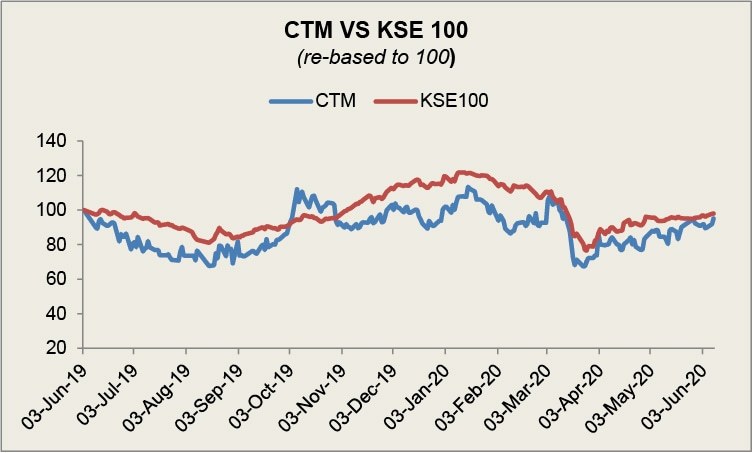Colony Textile Mills Limited (PSX: CTM) was established in 2011 as a textile manufacturing unit and acquired Colony Mills Limited and Colony Industries (Pvt) Limited in 2014. It is primarily engaged in the business of producing, manufacturing and selling of different types of yarn of various counts.
Shareholding pattern
The company is largely held by the directors, CEO, their spouses and minor children at nearly 49 percent. Of this almost 42 percent of the shares are owned by Mr. Fareed Mughis Sheikh, the CEO of Colony Textile Mills. The general public owns the other major chunk of the shareholding at 49 percent. The remaining, about 2 percent of the shares are distributed between the rest of the categories.

Historical operational performance
In the last six years, Colony Textile Mills saw revenue and profit margins dipping for two years, and reaching its lowest in FY16 before growing again in FY17.
During FY15 the textile industry overall faced challenges such as depressed demand and dumping of Indian and Chinese yarn and fabric in the domestic market which affected the local industry. Internationally, the governments of the regional peers were incentivizing their textile industries which led to lower prices, deeming Pakistani product uncompetitive. Thus, sales revenue contracted by 28 percent. On the other hand, costs rose to consume more than 95 percent of the revenue; the major drivers here were raw material purchases, salaries and fuel and power expense. High energy costs coupled with load shedding rendered them incapable to fully utilize their capacity. Thus, net margin fell to almost negative 6 percent.

Topline further fell in FY16 by close to 27 percent as demand failed to pick up in the international market. Pakistan’s export market had not been very diversified, with a major chunk of the exports directed towards the Chinese markets. The fall in demand from China led to serious repercussions for the country’s textile sector as a whole, since textile exports fell considerably in 2016. With low demand, prices also fell and companies had to liquidate inventory at lower prices. Cost of production, as a percentage of revenue, reached to nearly 98 percent leaving little room for absorption of other costs. Thus, net margin further fell close to negative 8 percent.

Sales revenue recovered as it grew by around 16 percent during FY17. However, most of the increase was brought in by incline in local sales, whereas export sales declined. Textile products from Pakistan continued to remain uncompetitive in the international market. Thus, the players found better margins in the local industry, as is evident by higher sales within the country. Local yarn and fabric sales saw a 26 percent climb. Cost of production, although lower than last year, was still high at more than 90 percent of the revenue. Apart from better sales revenue, other income also helped to lift margins; the latter mostly came from ‘gain on remeasurement of investments in IMSL’.

Topline further increased by 22.5 percent with both export sales and local sales gaining traction. However, this could not be translated into a higher bottomline. It is noted that the spinning and weaving industry benefits more from timely procurement of raw materials rather than topline-due to subdued prices. However, owing to insufficient working capital, the company was not able to do this, leading to a higher cost of raw material procurement. Thus, margins remained under constrained. In addition, the support from other income was also halved in the absence of ‘gain on remeasurement of investments in IMSL’ present last year.

Colony Textile Mills saw its highest revenue, growth rate of revenue and operating and net margins during FY19. the topline grew at 39 percent year-on-year. This was largely attributed to currency devaluation which allowed products from Pakistan to gain some competitiveness. However, costs continued to remain at above 90 percent of the revenue. In addition to this, shortage of working capital also remained a deterrent from profits to take off. The higher operating and net margin were due to the unprecedented rise in other income which came about as a result of ‘gain on restructuring from banking companies/financial institutions’. Moreover, the company also disposed off some assets to pay off debts, evident from lower finance cost. Thus, the company achieved its highest net margin.
Quarterly results and future outlook
Topline reduced in 9MFY20 year on year by close to 9 percent. This was attributed to the elimination of zero-rated tax regime for the textile sector. In addition, a 17 percent GST was imposed on unregistered persons which affected industry growth. Cost of production reduced as a percentage of revenue, although it was still above 90 percent, which allowed gross margins to improve. However, this was not translated into higher net margin as other income reduced by 5 times year on year.

Although the shut-down of industries in Pakistan happened in the last week of March, the pandemic was present globally leading to a halt in trade. This led to delay and cancellation of orders which had started to affect the local companies. While the company acknowledges the steps taken by the government to support the export-oriented industries, it will take a significant time to recover from this slowdown.
Taking a step towards value addition, Colony Textile Mills has ‘incorporated an export-oriented wholly owned subsidiary’ -StitchRite (Private) Limited, under which they would manufacture and export garments. The company expects to commence production in the near future.





























Comments
Comments are closed.